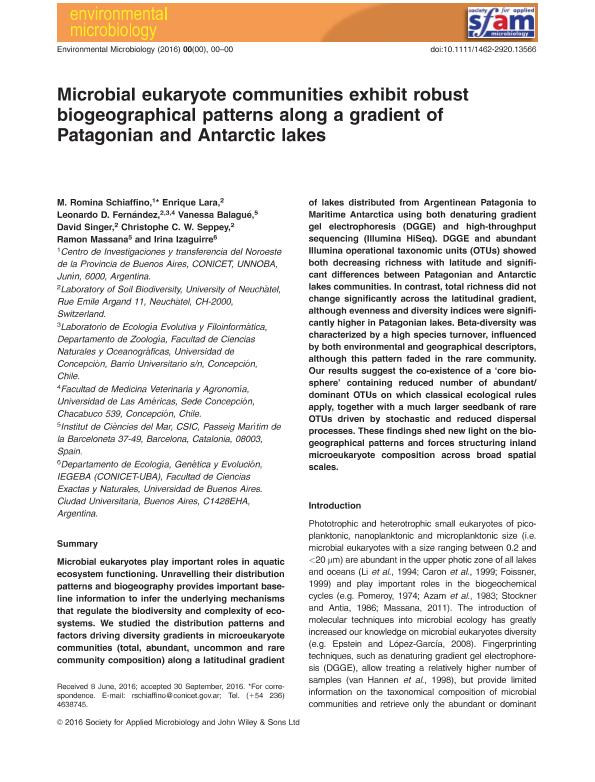Mostrar el registro sencillo del ítem
dc.contributor.author
Schiaffino, María Romina

dc.contributor.author
Lara Pandis, Enrique Miguel

dc.contributor.author
Fernández, Leonardo D.
dc.contributor.author
Balagué, Vanesa
dc.contributor.author
Singer, David
dc.contributor.author
Seppey Christophe C. W.
dc.contributor.author
Massana, Ramon
dc.contributor.author
Izaguirre, Irina

dc.date.available
2018-06-08T19:25:27Z
dc.date.issued
2016-10
dc.identifier.citation
Schiaffino, María Romina; Lara Pandis, Enrique Miguel; Fernández, Leonardo D.; Balagué, Vanesa; Singer, David; et al.; Microbial eukaryote communities exhibit robust biogeographical patterns along a gradient of Patagonian and Antarctic lakes; Wiley Blackwell Publishing, Inc; Environmental Microbiology; 18; 12; 10-2016; 5249-5264
dc.identifier.issn
1462-2912
dc.identifier.uri
http://hdl.handle.net/11336/47950
dc.description.abstract
Microbial eukaryotes play important roles in aquatic ecosystem functioning. Unravelling their distribution patterns and biogeography provides important baseline information to infer the underlying mechanisms that regulate the biodiversity and complexity of ecosystems. We studied the distribution patterns and factors driving diversity gradients in microeukaryote communities (total, abundant, uncommon and rare community composition) along a latitudinal gradient of lakes distributed from Argentinean Patagonia to Maritime Antarctica using both denaturing gradient gel electrophoresis (DGGE) and high-throughput sequencing (Illumina HiSeq). DGGE and abundant Illumina operational taxonomic units (OTUs) showed both decreasing richness with latitude and significant differences between Patagonian and Antarctic lakes communities. In contrast, total richness did not change significantly across the latitudinal gradient, although evenness and diversity indices were significantly higher in Patagonian lakes. Beta-diversity was characterized by a high species turnover, influenced by both environmental and geographical descriptors, although this pattern faded in the rare community. Our results suggest the co-existence of a "core biosphere" containing reduced number of abundant/dominant OTUs on which classical ecological rules apply, together with a much larger seedbank of rare OTUs driven by stochastic and reduced dispersal processes. These findings shed new light on the biogeographical patterns and forces structuring inland microeukaryote composition across broad spatial scales.
dc.format
application/pdf
dc.language.iso
eng
dc.publisher
Wiley Blackwell Publishing, Inc

dc.rights
info:eu-repo/semantics/openAccess
dc.rights.uri
https://creativecommons.org/licenses/by-nc-sa/2.5/ar/
dc.subject
Biogeographical Patterns
dc.subject
Core Biosphere
dc.subject
Dgge
dc.subject
High-Throughput Sequencing
dc.subject.classification
Otras Ciencias Biológicas

dc.subject.classification
Ciencias Biológicas

dc.subject.classification
CIENCIAS NATURALES Y EXACTAS

dc.title
Microbial eukaryote communities exhibit robust biogeographical patterns along a gradient of Patagonian and Antarctic lakes
dc.type
info:eu-repo/semantics/article
dc.type
info:ar-repo/semantics/artículo
dc.type
info:eu-repo/semantics/publishedVersion
dc.date.updated
2018-05-30T14:27:23Z
dc.journal.volume
18
dc.journal.number
12
dc.journal.pagination
5249-5264
dc.journal.pais
Reino Unido

dc.journal.ciudad
Londres
dc.description.fil
Fil: Schiaffino, María Romina. Consejo Nacional de Investigaciones Científicas y Técnicas. Centro de Investigaciones y Transferencia del Noroeste de la Provincia de Buenos Aires. Universidad Nacional del Noroeste de la Provincia de Buenos Aires. Centro de Investigaciones y Transferencia del Noroeste de la Provincia de Buenos Aires; Argentina
dc.description.fil
Fil: Lara Pandis, Enrique Miguel. Universite de Neuchatel; Suiza
dc.description.fil
Fil: Fernández, Leonardo D.. Universite de Neuchatel; Suiza. Universidad de Concepción. Facultad de Ciencias Naturales y Oceanografía; Chile. Universidad de Las Américas; Chile
dc.description.fil
Fil: Balagué, Vanesa. Consejo Superior de Investigaciones Científicas. Instituto de Ciencias del Mar; España
dc.description.fil
Fil: Singer, David. Universite de Neuchatel; Suiza
dc.description.fil
Fil: Seppey Christophe C. W.. Universite de Neuchatel; Suiza
dc.description.fil
Fil: Massana, Ramon. Consejo Superior de Investigaciones Científicas. Instituto de Ciencias del Mar; España
dc.description.fil
Fil: Izaguirre, Irina. Consejo Nacional de Investigaciones Científicas y Técnicas. Oficina de Coordinación Administrativa Ciudad Universitaria. Instituto de Ecología, Genética y Evolución de Buenos Aires. Universidad de Buenos Aires. Facultad de Ciencias Exactas y Naturales. Instituto de Ecología, Genética y Evolución de Buenos Aires; Argentina
dc.journal.title
Environmental Microbiology

dc.relation.alternativeid
info:eu-repo/semantics/altIdentifier/url/http://onlinelibrary.wiley.com/doi/10.1111/1462-2920.13566/full
dc.relation.alternativeid
info:eu-repo/semantics/altIdentifier/doi/http://dx.doi.org/10.1111/1462-2920.13566
Archivos asociados
